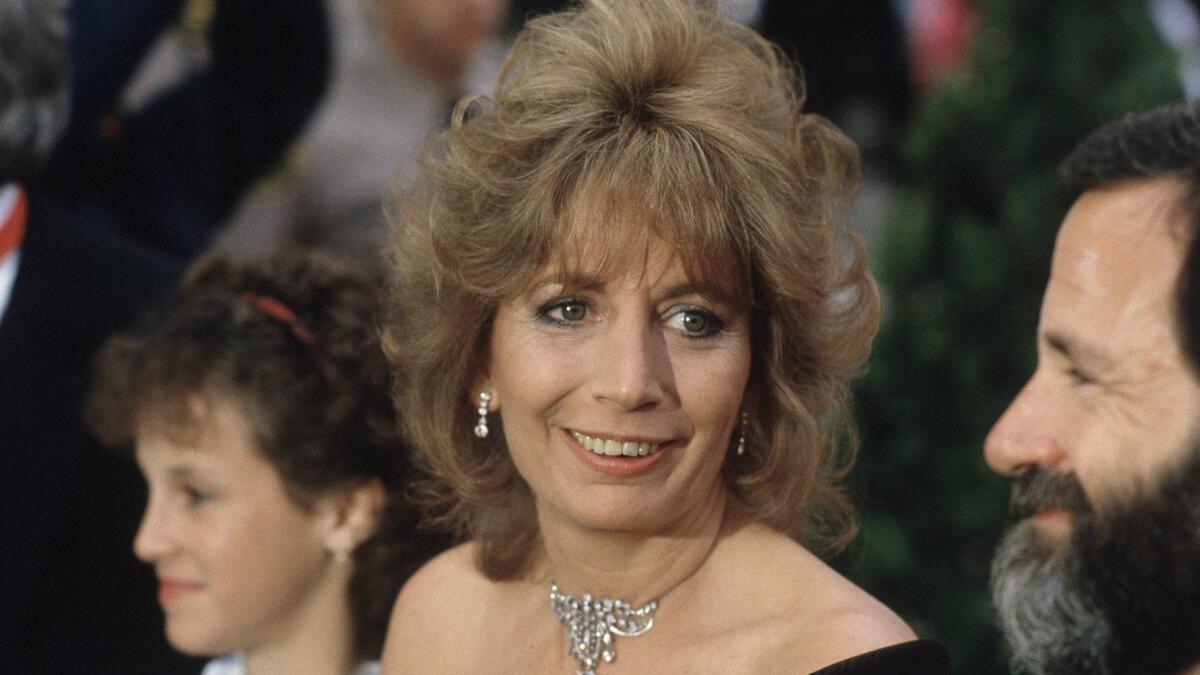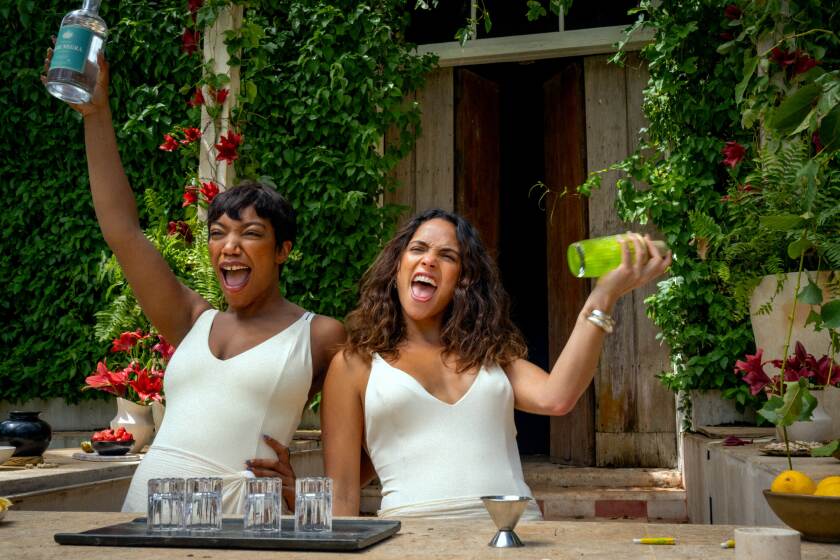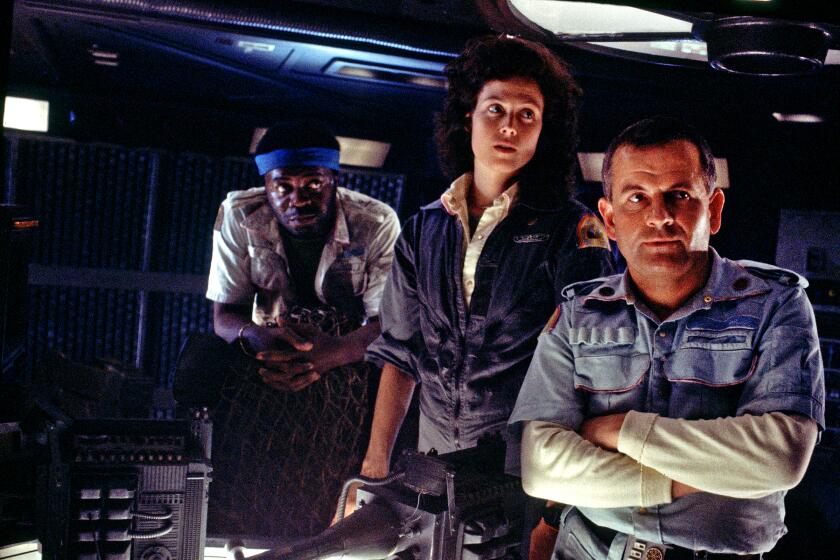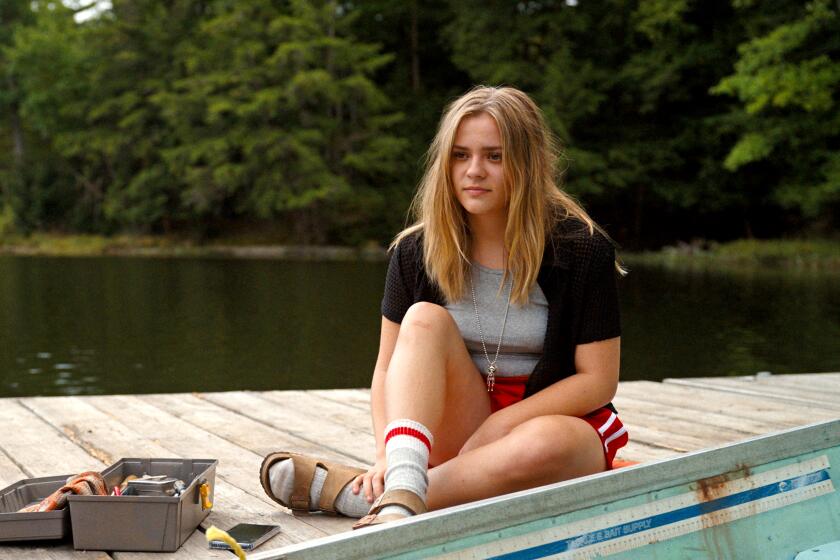From the Archives: With the success of 1988’s ‘Big,’ Penny Marshall’s career turned a corner

In 1988, actress-turned-director Penny Marshall, who died Tuesday at 75, wowed critics and moviegoers with her fantasy-comedy “Big,” which helped transform comedy actor Tom Hanks into an acclaimed leading man. After the film’s successful opening, Marshall sat down with The Times to discuss its creation as well as her career path. This story was originally published in The Times on June 8, 1988.
Penny Marshall insisted she wasn’t tired. “I’m beyond tired,” she groaned, waving a limp hand in the air as she lay on a couch in her living room. “I just want to rest now--I’ve got to get some brain cells back.”
Her new film, “Big,” which stars Tom Hanks as a 12-year-old boy suddenly transformed into manhood, just opened last weekend--to favorable reviews and hefty ticket sales.
However the prospect of the film’s opening, which was preceded by celebrity-studded premiere a few days earlier, had Marshall immobilized with anxiety.
READ MORE: Penny Marshall remembered for her TV and film achievements »
“I’m a worrier,” she explained, lighting a Marlboro. “I got all worked up about this screening--you know, all the industry people and their expectations, whether my friends will show up or go to the Lakers game instead. So I woke up at about 3:30 in the morning in a complete panic.
“I always have these anxiety attacks. But my anxiety manifests itself in strange ways. I usually get catatonic--so when I get really distraught I fall asleep. Who knows--I’m going to New York tomorrow, so I’m worried about packing. I could just pack now, but that would be too easy. Or I could pack when I get up, but.... “
Marshall furrowed her brow--was there a brooding spell she’d forgotten to mention? “I’m always worried about forgetting my toothpaste, as if they don’t have toothpaste in New York.”
A self-professed lazybones with a nasal New York accent and a self-deprecating sense of humor, she happily tells tales of her bumpy transition from TV celeb to film director--all the while reclining on her couch, lifting her head only to answer the telephone or slurp her favorite drink, a bubbly concoction of milk and Pepsi.
“I could just sleep forever,” she said. Then her mood brightened. “Maybe the writers’ strike will go through Christmas and I won’t have to work again this year!”
After “Big’s” brawny opening weekend, Marshall will have to turn down plenty of offers. The light-hearted comedy did $8.2 million in 1,100 theaters, making it the week’s No. 2 box-office contender, beating out “Rambo III” and Chevy Chase’s “Funny Farm,” even though both films opened in far more theaters.
To hear Marshall describe it, her career has been buoyed by a series of lucky accidents, abiding friendships and convenient family ties. She insists she’s “not really” driven, admitting that her initial ambition in life was to be a secretary.
“I was never goal-oriented,” she said. “I just stay in my bed and wait for someone to call. That way, I figure if they call and I’m in bed, then they must really want me.”
Born in New York, she attended the University of New Mexico and subsequently moved to Hollywood. There she married Rob Reiner and began working in television, first as a bit player, then as a semi-regular on “The Odd Couple” and finally, in 1976, as the co-star of the long-running “Laverne and Shirley.” (She and Reiner split up in 1979.)
After the show left the air in 1983, she took a few years off and traveled. Since then--at least by her account--she’s devoted most of her energy to catching up on her sleep. During her few waking hours, she directed “Jumping Jack Flash” with Whoopi Goldberg and now “Big.” (In late 1984 she was slated to direct “Peggy Sue Got Married” but lost the job after a flurry of “creative differences.”)
It’s easy to understand why Marshall has such a wide circle of show-biz friends, including Debra Winger, Carrie Fisher and Albert Brooks. Longtime pals say she’s intensely loyal and always approachable.
“She’s a 24-hour friend,” said longtime pal Dennis Klein, who was a writer-producer of “The Buffalo Bill Show.” “She’s very lovable and accepting. And she’s such a worrier and so insecure that she’s always there for you. You can call her at 3 a.m. and get some good talk going--you could say she comes through when others are asleep.”
To a first-time acquaintance, her dedicated pessimism was somehow endearing. She’s a comic-depressant, an ‘80s Oscar Levant. (Asked how deep her insecurities are, she quipped: “I was born with a frown.”)
Even in her frazzled state, she was candid and full of fretful energy--you sense that Marshall is a vulnerable spirit who freely crosses the border between humor and Angst. At one point, her male assistant answered a call before she could reach the phone. “Can you believe it--they hung up because a man answered,” she explained. “It could’ve been Mr. Right!”
Early in her career, Hollywood wags claimed she got preferential treatment--her brother, Garry, produced “The Odd Couple” and “Laverne and Shirley” and was a dominant force in ‘70s TV. “I’m sure people thought I got parts because my brother was being nice, and at first I probably thought the same thing,” she said. “But my brother finally told me--’I’m not giving you a job ‘cause I’m nice. I’m not that nice.’ ”
Still, Marshall doesn’t exactly exude self-confidence. “I always feel like somehow I’m going to be a failure,” she said glumly. “You know, when people tell me how well ‘Big’ is going to do I immediately say, ‘But this is the fourth movie this year with the same premise, and there’s 18 other films with ‘Big’ in the title and. . . . “
Marshall coughed violently--”I’m convinced I have some kind of walking pneumonia”--then lit up another cigarette. “I’m from the negativity and depression school. When I see bad reviews, I say, ‘Yeah, they’re probably right.’
“I think my problem is that I have a massive insecurity complex combined with a very huge ego. If I could just trust my instincts, which I’m told are good, I’d be all right. But I never say, ‘Do it this way because I want it this way.’ I just mumble and make people keep asking me for my opinion until they get it out of me.”
Humor is also a prized Marshall weapon; she uses it to entertain as well as to deflect attention from uncomfortable topics. Dodging queries about “Big’s” budget, she groaned: “I don’t worry about the money--when they tell me to stop, I just stop. I’m not a film expert--I can’t even work a Betacam!” (The budget for “Big” was about $18 million, according to studio sources.)
Asked her age, she instantly retorted: “105!” (According to her press clips, she’s about 44.)
“I guess I just hide behind things, whether it’s my whining or my sense of humor,” she concluded. “Every once in a while I’m decisive--for about a minute. For me, acting was easier, because the gun goes off and you have to go for it. With directing, I know people on movie sets want leadership, but I don’t exude that captain-of-the-ship image. I’d get on the phone with (“Big” producer) Jim Brooks and apologize all the time and say, ‘I’m no good at this.’ ”
Marshall offered a rueful grin. “I think if he didn’t know me as well as he did, he would’ve been scared that I was running the movie.”
After watching Marshall spend hours curled up on her couch, you do begin to wonder--how could someone so seemingly passive and insecure actually have the indomitable spirit necessary to direct a major Hollywood film?
“Penny has an iron will, which is a thing that almost everybody misses,” insisted James Brooks, who produced “Big” and has known Marshall since their days at Paramount Television in the early ‘70s. “You can’t do the job she’s done and have it be dictated by insecurities. Penny has great creative instincts and a real openness to the creative process. She would talk to her actors very honestly and I think that made her actors trust her.
“One of the most difficult things for an actor like Tom Hanks who’s become so prominent is keeping that ability to trust. But he trusted Penny and you can see the results--he wasn’t locked off, with his performance already stuck in his mind. He responded to her openness.”
Writer-producer Klein put it another way: “Every director has a secret weapon for getting people to do their bidding, especially when people don’t want to do that bidding. And Penny’s weapon is that she comes off as helpless and insecure. So she’s able to stick to her guns in such a self-effacing way that you want to help her out, even if it’s not in your self-interest.”
In “Big,” Marshall’s toughest assignment was to prevent Hanks--an actor accustomed to playing glib, irreverent characters--from overplaying the part.
“This was a very nonverbal role, so I really thought Tom had to be innocent and shy,” she explained. “I knew that took away one of his favorite weapons--his verbal assurance--but I had to convince him that he had to be 12, not play at being 12.
“So I surrounded him with dramatic actors, like John Heard and Robert Loggia, hoping that their presence would keep him in check. And whenever we’d try a new scene, I’d let Tom get comfortable and try different approaches--then I’d tell him, ‘Bring it in, bring it down. ‘ “
(Tom Hanks’ press agent said that he was in Los Angeles shooting a movie, but could not be reached for comment.)
After a dozen years doing series TV, Marshall has a bagful of tricks. When she was auditioning her 12-year-old actors (“We went through every kid in the New York City school system”), she quickly discovered that her inexperienced charges had trouble staying loose.
“I found they could be a lot more natural if you gave them some props to play with, like baseball cards and toys. I even put up a basketball hoop in the office so they could shoot Nerf balls and wouldn’t get so stiff when they were reading lines.”
If only it had been that easy for Marshall to adjust to the regime of directing “Big.”
“I’ve never been a morning person,” she admitted, firing up one last cigarette. “So I decided the way for me to get up in time was to practice going to sleep a half-hour earlier each night for about a month before we started shooting. That way I’d be on schedule by the night before we started.”
Did the strategy work? “No way,” she laughed. “I didn’t sleep that night either!”
Her visitor was curious. Here’s a woman who’s achieved success--first as an actress, now as a director--in the distinctly male world of Hollywood. But you don’t get the impression that success has brought her a full measure of happiness.
Marshall displayed her favorite mask--a frown. “Everyone says I’m happiest when I’m working because I’m so miserable,” she finally replied. “But I don’t know. I guess I enjoy myself the most when I’m traveling or when I’m laughing.”
She shrugged. “But you know--usually I wait till someone tells me I’m happy.”
More to Read
Only good movies
Get the Indie Focus newsletter, Mark Olsen's weekly guide to the world of cinema.
You may occasionally receive promotional content from the Los Angeles Times.










